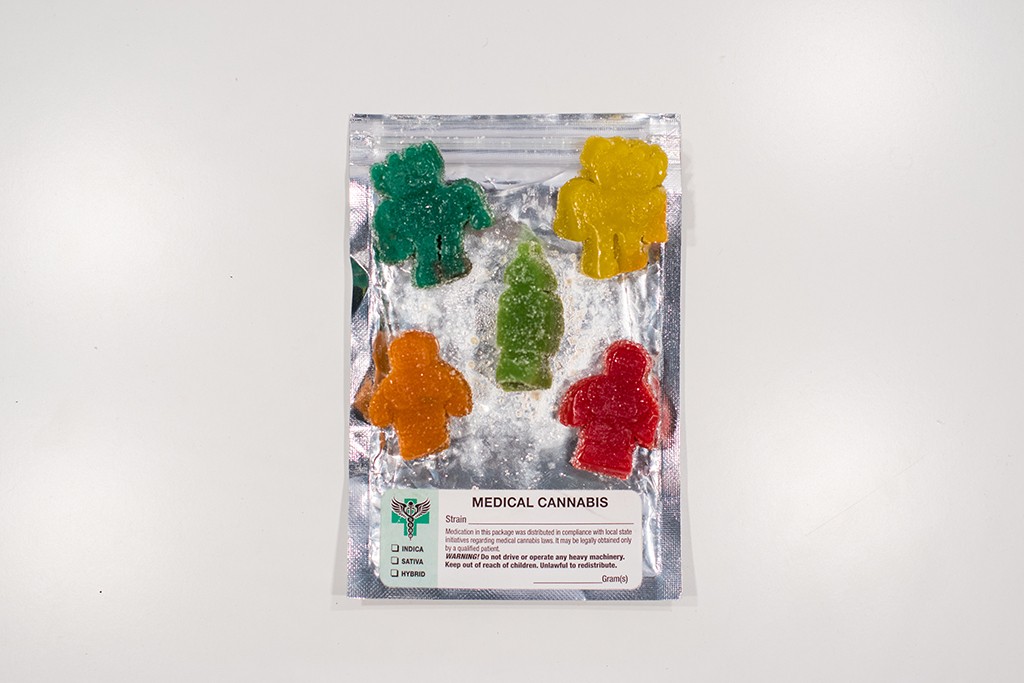Marijuana edibles offer an alternative to smoking cannabis, but understanding their effects and how long they linger in your system is crucial. While the appeal of tasty treats and smoke-free consumption is growing, especially with increasing legalization, edibles have distinct characteristics and potential risks. This guide, reviewed by healthcare professionals, delves into the duration of edibles’ effects, how long they stay detectable in your body, safety considerations, and legal aspects.
What Are Marijuana Edibles?
Marijuana edibles are food or drink products infused with cannabinoids, primarily THC (tetrahydrocannabinol). These come in diverse forms, from familiar baked goods and candies to beverages and capsules. As legalization expands, the variety of edible products has increased significantly. It’s important to be aware that many edibles, particularly candies, can closely resemble non-infused versions, posing a potential risk, especially for children.
 Marijuana edibles
Marijuana edibles
How Edibles are Processed by Your Body
When you consume an edible, it embarks on a journey through your digestive system. Unlike smoking, where THC is rapidly absorbed into the bloodstream via the lungs, edibles take a slower route. Once digested, cannabis compounds reach the liver. Here, delta-9 THC is transformed into 11-hydroxy-THC. This conversion is significant because 11-hydroxy-THC is more potent and psychoactive than delta-9 THC, the primary form inhaled when smoking.
This digestive process leads to a delayed onset of effects. While smoking or vaping can produce a high within minutes, edibles typically take 30 minutes to two hours to take effect. This delay can be deceptive, leading to “overconsumption” as individuals may ingest more, thinking the initial dose is insufficient.
Interestingly, the type of edible can influence absorption speed. Edibles that dissolve in the mouth, like lozenges or some chocolates, may lead to faster absorption as THC can be absorbed directly through the oral mucosa, bypassing some of the digestive process.
The effects of edibles also last considerably longer than smoked cannabis. A high from smoking might last for a few hours, whereas edibles can produce effects that extend for up to 12 hours, and sometimes even longer for some individuals.
How Long Do Edibles Stay in Your System?
The question of “How Long Do Edibles Last in your system?” is multifaceted. THC from edibles, like all forms of cannabis, doesn’t simply vanish from your body immediately after the effects wear off. The duration THC remains detectable depends on several factors:
- Frequency of Use: Occasional users metabolize and eliminate THC faster than habitual users. Chronic, heavy users accumulate THC in body fat over time, leading to prolonged detection windows.
- Dosage: Higher doses of THC, naturally found in stronger edibles or larger servings, will take longer to clear from your system.
- Metabolism: Individual metabolic rates vary. People with faster metabolisms will process and eliminate THC more quickly.
- Body Composition: THC is fat-soluble and stored in fat cells. Individuals with higher body fat percentages may retain THC for longer periods.
- Type of Edible and Consumption Method: While the processing pathway is similar, individual variations in digestion and absorption can play a minor role.
Generally, THC from edibles can be detected in the system for 3 to 12 days for occasional users. However, for frequent, heavy users, it can take 30 days or even longer for all traces of THC to become undetectable.
It’s crucial to understand that “system” can refer to different bodily fluids and tissues, each with varying detection windows, as discussed further in the drug testing section. While the subjective “high” from edibles wears off within hours, the metabolic byproducts of THC persist for a longer duration.
Will Edibles Show Up on Drug Tests?
Yes, absolutely. Consuming edibles will result in a positive drug test for THC. The method of ingestion—eating versus smoking—is irrelevant in terms of drug test detection. In fact, due to the metabolic pathway of edibles, they might be detectable for a longer period compared to smoked cannabis, especially for urine tests.
Drug tests detect the presence of THC metabolites, not just THC itself. Different types of drug tests have varying detection windows:
- Blood Tests: Blood tests have the shortest detection window, typically detecting THC for 3-4 hours after consumption. They are primarily used to detect current impairment.
- Saliva Tests: Saliva tests can detect THC for approximately 24-72 hours. This window is also relatively short and often used for roadside or immediate testing.
- Urine Tests: Urine tests are the most common drug testing method and have a moderate to long detection window. THC can be detected in urine for 3-30 days, depending on usage frequency, dosage, and individual factors as discussed earlier.
- Hair Follicle Tests: Hair follicle tests offer the longest detection window, potentially detecting THC for up to 90 days. However, hair tests are less common for routine drug screening and may be more expensive.
If you are facing a drug test, especially a urine test, and have recently consumed edibles, it is highly likely to produce a positive result if the test falls within the detection window.
Legal Status of Edibles
The legality of marijuana edibles is complex and varies significantly depending on location. Laws are constantly evolving, with more regions moving towards decriminalization or legalization of cannabis, both for medicinal and recreational use.
As of the latest information, numerous states and territories in the United States have legalized marijuana in some form:
- States with Legal Recreational and Medicinal Marijuana: Alaska, California, Colorado, Connecticut, Delaware, Illinois, Maine, Maryland, Massachusetts, Michigan, Missouri, Montana, Nevada, New Jersey, New Mexico, New York, Oregon, Rhode Island, Vermont, Washington, and the District of Columbia.
- States with Legal Medicinal Marijuana Only: Arizona, Arkansas, Florida, Hawaii, Louisiana, Minnesota, New Hampshire, North Dakota, Ohio, Oklahoma, Pennsylvania, Utah, West Virginia.
However, even within states where marijuana is legal, specific regulations regarding edibles can differ. Some regions may have specific restrictions on potency, packaging, or sales locations of edibles. Other areas may have ambiguous laws, and in such cases, it’s prudent to assume edibles are not permitted.
It is essential to research and understand the specific laws regarding marijuana edibles in your state or region before purchasing or consuming them. Laws can change, so staying updated is crucial.
Safety Concerns and Risks Associated with Edibles
While often perceived as a safer alternative to smoking, edibles are not without risks. It’s crucial to be aware of potential adverse effects and practice responsible consumption.
- Psychoactive Effects and Overconsumption: The delayed onset of effects makes it easier to overconsume edibles unintentionally. This can lead to stronger and more prolonged psychoactive experiences than desired, including anxiety, paranoia, hallucinations, and panic attacks.
- Cannabis-Induced Psychosis: In susceptible individuals, particularly those with pre-existing mental health conditions, high doses of THC from edibles can trigger cannabis-induced psychosis, characterized by hallucinations, delusions, and disorganized thinking.
- Hyperemesis Syndrome: Some individuals may experience cannabinoid hyperemesis syndrome, marked by severe nausea, vomiting, and abdominal pain, often associated with chronic, heavy cannabis use, including edibles.
- Cardiovascular Risks: For older adults or individuals with pre-existing heart conditions, high THC doses can potentially lead to cardiovascular events due to THC’s impact on the cardiovascular system.
- Cognitive and Motor Impairment: Edibles can impair cognitive functions, coordination, and judgment, increasing the risk of accidents and injuries.
- Risks During Pregnancy: THC can cross the placenta and potentially affect fetal brain development. Therefore, cannabis consumption, including edibles, is not recommended during pregnancy.
- Addiction Potential: THC, regardless of the form of consumption, has the potential for addiction. Regular edible use can lead to dependence and marijuana use disorder in some individuals.
- Contamination and Lacing: In unregulated markets, there is a risk of edibles being contaminated or laced with other substances, including dangerous synthetic cannabinoids like K2/Spice.
Given these risks, responsible edible consumption is paramount. Start with low doses, especially if you are new to edibles. Wait for the full effects to manifest before consuming more. Purchase edibles from legal, regulated sources to ensure product safety and accurate labeling. Store edibles securely, out of reach of children and pets, due to their appealing appearance.
Recent Developments in Edibles Legalization
The legal landscape surrounding marijuana edibles is dynamic, with continuous developments. Recent news highlights ongoing changes:
- Missouri’s Medical Marijuana Market Expansion: Missouri, which legalized medical marijuana, began sales in dispensaries in late 2020. Initially, only cannabis flower was available, but dispensaries planned to introduce edibles and other product forms, expanding patient access.
- Florida Legalizes Medical Edibles: Florida, already permitting medical marijuana use and smokable forms, expanded its legislation to include edibles for medicinal purposes in August 2020. This move aimed to provide alternative consumption methods for patients who prefer not to smoke or have difficulty with pills, further broadening access for medical users.
- Montana’s Recreational Marijuana Initiative: Montana, which had already legalized medical marijuana, considered a ballot initiative in 2020 to legalize recreational marijuana. This initiative, if passed, would further relax cannabis laws in the state, reflecting the broader trend towards legalization.
These examples illustrate the ongoing evolution of marijuana laws and the increasing acceptance and availability of edibles in various regions.
Have questions about addiction? Call us at 855-430-9426 to speak with a recovery specialist.
